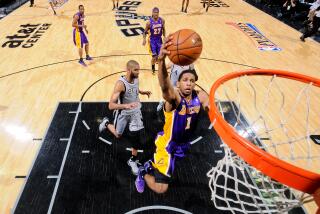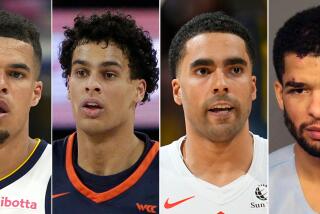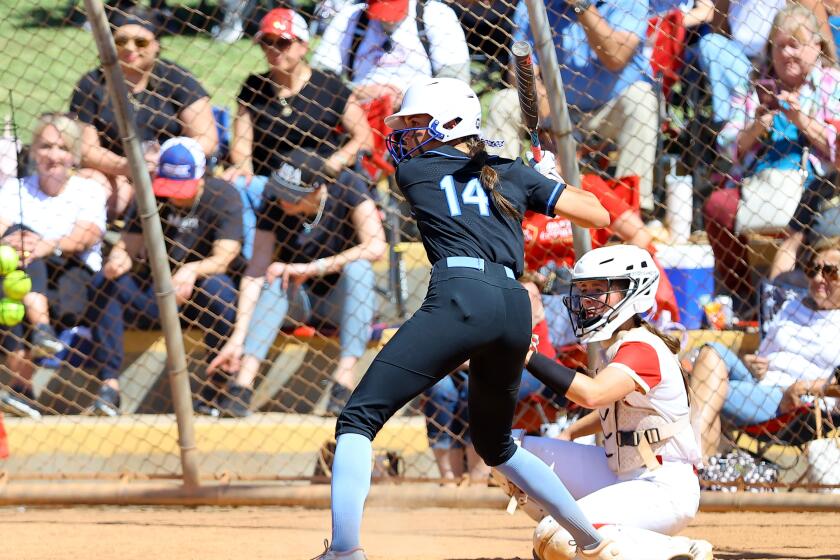Porter Is No Secret to Pistons : Trail Blazers: After toiling in relative obscurity in Portland, he’s in the spotlight in the NBA finals.
- Share via
AUBURN HILLS, Mich. — Versatile Terry Porter defies easy categorization. He is a playmaker, but he also is a defensive specialist, three-point bomber and fast-break conductor.
He has developed into the Portland Trail Blazers’ leader, although he will not admit it.
There is one other label Porter has only recently been handed by arbiters of NBA style and status.
Porter has become the Joe Dumars of the 1990 NBA playoffs. That is, a grossly underrated guard who comes to national prominence from the shadow of more celebrated teammates.
Similarities between the Pistons’ Dumars, last season’s most valuable player in the playoffs, and Porter, the Trail Blazers’ versatile point guard, are striking.
Both come from small colleges--Dumars from McNeese State in Louisiana, Porter from Wisconsin Stevens Point--and were late first-round draft picks in 1985. Both have played in relative obscurity because of flashy, high-profile backcourt teammates--Isiah Thomas in Detroit, Clyde Drexler in Portland. Both are 6 feet 3.
Both have the strength, speed and tenacity to guard Michael Jordan or Magic Johnson or Kevin Johnson with fewer problems than most. Both are nice, unassuming guys who do not fill up reporters’ notebooks nearly as often as they do the basket.
Dumars’ coming-out party in last season’s playoffs resulted in a Piston championship, an MVP award and long-overdue recognition.
If Porter is to carry this comparison to its extreme, he and the Trail Blazers will have to do it against Dumars and the Pistons starting tonight in Game 1 of the NBA finals.
Just as Dumars’ blandly said about himself at this time last year, Porter insists he does not care about personal success so much as helping the Trail Blazers win an NBA championship for the first time since the Walton Gang in 1976-77.
“We just never get that much exposure,” said Porter, typically thinking strictly in a team context. “If we had been in a bigger market, winning 59 games, we would’ve gotten a lot more press. Me too, I guess.
“If you ask the average fan how many games we won or to name our starting lineup, I don’t think they could do it. People now have to be aware of the kind of players we have on our ballclub and how good we must be to get to this point.”
To date, the only Trail Blazer with any real name recognition among casual sports fans has been Drexler. He had a high-profile college career at Houston, a catchy nickname, Clyde the Glide, and makes all the highlight footage with his contortionist dunks.
Porter, however, proved more valuable than Drexler in Portland’s seven-game victory over the San Antonio Spurs and six-game ouster of the Phoenix Suns.
“Terry just seems to play consistently, game by game,” Trail Blazer Coach Rick Adelman said. “Then, we get into a big situation or a big game and he asserts himself. He has always risen to the occasion. He’s been doing it for years. Now, he’s doing it on national television, and people are aware of it. What he has done is raise his game. In the playoffs, great players do that.”
Porter, tied with Jerome Kersey as the Trail Blazers’ leading playoff scorer at 21 points a game, has been consistently good and often great in big games.
--Game 5 against San Antonio: Porter scored 27 points in the first half. Then, after the Spurs had rallied from a 22-point deficit, he scored seven of Portland’s last 14 points in a double-overtime victory.
--Game 7 against the Spurs: Porter scored 36 points against San Antonio’s sagging defense. And, although Drexler made a crucial three-point shot in the fourth quarter and scored eight of Portland’s 11 points in overtime, Porter made four earlier three-pointers that kept the Trail Blazers close.
--Game 1 against Phoenix: Porter’s defense kept Kevin Johnson from driving the lane. Left alone on the perimeter, Porter sank two jump shots that enabled Portland to regain the lead in the fourth quarter. And, after Drexler and Kevin Duckworth had committed consecutive turnovers in the final minute, Porter flawlessly executed a pick-and-roll play that resulted in Duckworth’s game-winning shot with 17 seconds left.
--Game 2 against the Suns: Porter made a three-pointer that tied the score, 106-106, in the final 28 seconds, then again ran the pick-and-roll play with Duckworth. Only this time, Porter kept the ball and sank a game-winning jump shot with 13 seconds left.
--Game 5 against the Suns: Porter’s defense helped preserve another close victory. With Portland clinging to a one-point lead, Porter stripped the ball from Jeff Hornacek under Phoenix’s basket with 20 seconds to play and flipped it to teammate Buck Williams. Williams later called it the game’s most important play.
--Game 6 against the Suns: Porter made four three-pointers, including one with 3:15 left that cut Phoenix’s lead from six to three points. Two minutes later, he made two free throws that pulled Portland within one point.
“He does that every game,” Drexler said. “I just love to watch Terry Porter play.”
Said Adelman: “Terry just rises up in the big moments.”
Because of that, Porter is gaining recognition--not just as a defensive specialist, but as a complete player. Opponents have known that for the last few seasons, but Porter now appears ready to go public.
Larry Brown, the Spurs’ coach, said Porter’s presence is always felt when playing the Trail Blazers.
“He defends, he shoots, he gets loose balls,” Brown said. “Some of the fans may not know how good he is, but we do. I guarantee you, when you stick Terry Porter’s name up on the blackboard before the game, our players know what that means.”
It usually means a tough, exhaustive night for the opposing point guard. Although Kevin Johnson averaged 21.8 points and shot 53.8% in the series, he was shut down by Porter at crucial times. In Game 5, for instance, Johnson went scoreless for the final seven minutes and could not get the ball in the Suns’ final possession.
Porter’s defensive instincts are just that. But he also said he was conditioned to concentrate on defense before offense while at Wisconsin Stevens Point, where he was twice named NAIA All-American.
That Porter wound up a first-round choice, let alone earning a seven-figure contract and playing in the NBA finals, seems unlikely when he recalls his introduction to basketball.
He grew up in a poor section of Milwaukee. Porter was the youngest of six children and did not pick up a basketball until he was 12, when his parents divorced. He did not try out for his high school team until his junior season, choosing instead to play in a YMCA league. He made the high school team as a reserve as a junior, then started as a senior.
Scholarship offers never came, so Porter went to UW Stevens Point, an NAIA and NCAA Division III school that does not award athletic scholarships. Porter worked two jobs to pay off student loans, but he said it was worth it because he developed as a basketball player and student in the potato and dairy town of 23,000.
Porter was a forward in college. But even then he would guard the opponent’s best scorer, whether the opponent was a guard or forward.
By Porter’s junior season, when it became apparent that he had NBA potential, his coach, Dick Bennett, had Porter work extra on ballhandling, preparing him to play point guard.
Porter finally got his first glimpse of the big time the summer of his junior year, when he made it to the final 20 of Bobby Knight’s Olympic trials. Had he not come down with chicken pox and missed two weeks, he might have made the gold medal-winning team. Knight reportedly liked Porter’s defense and attitude.
A good showing at the 1985 Portsmouth, Va., Invitational tournament, a postseason all-star event scouted heavily by the NBA, further enhanced Porter’s rating. He was the 24th selection that year, six choices behind Dumars and one ahead of the Lakers’ A.C. Green.
Porter did not see where he would fit in at Portland. The Trail Blazers already had Drexler and Jim Paxson as their big guards and Steve Colter and Darnell Valentine as point guards.
Porter made the team but, at first, did not play much. Eventually, Valentine was traded and Colter was benched and later traded.
“I just slowly improved on my ballhandling skills over the years since moving to point guard,” Porter said. “The first year, definitely, was an adjustment for me. I had no intention of playing forward in the NBA, so I knew what I had to do. I knew that much. . . . For me to have a long career in this business was to play point guard.”
He has been quite successful in the business. In fact, Porter and his agent, Charles Besser, pulled off a coup last summer.
A restricted free agent, meaning the Trail Blazers could match any offer, Porter agreed to a one-season, $1.7-million offer sheet from the Denver Nuggets. The Nuggets were hoping that Portland would not match the offer, since Porter would have been an unrestricted free agent the next season. Or, even if Portland matched it, that Porter would show “good faith” and come to Denver as an unrestricted free agent in 1991.
Instead, Porter’s agent worked out a lucrative long-term deal to keep Porter in Portland. And, his six-season, $13.2-million contract keeps Porter quite happy.
“The most important thing wasn’t to say, ‘Well, I got this contract, now let’s forget about trying hard,’ ” Porter said. “I went the other way. I worked very hard over the summer on my game. Without a doubt, I’m going to continue working on my game.”
Porter primarily improved his outside shooting. He made a career-high 89 three-point shots this season. In the playoffs, he has made 33 of 77 three-pointers.
Leadership, however, has been Porter’s most important playoff contribution.
“I don’t think I’m the leader,” he said. “We have so many guys on this team that can fit that role. I’m not like Magic (Johnson) in L.A. or (Larry) Bird in Boston, that type of leader. We don’t have that here. Everybody does the job they need to be done.”
Adelman views it another way.
“He’s taken over the team,” he said of Porter.
More to Read
Go beyond the scoreboard
Get the latest on L.A.'s teams in the daily Sports Report newsletter.
You may occasionally receive promotional content from the Los Angeles Times.










